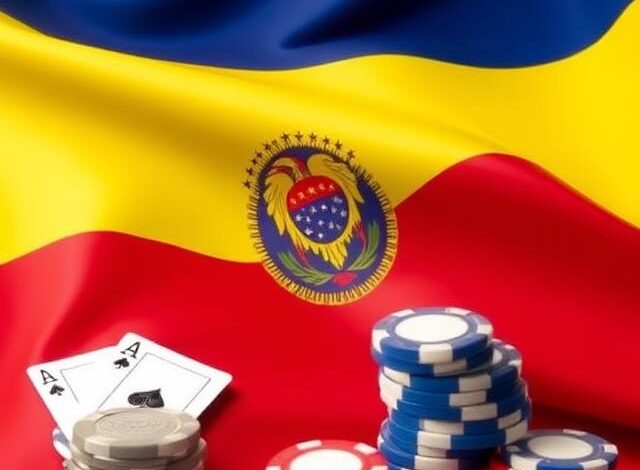Government Plans to Review Gambling VAT Amid Broader Tax Overhaul in Colombia

Colombia is gearing up for a significant shift in its fiscal landscape as the Ministry of Finance prepares to unveil a new “Tax Budget Proposal” by the end of July. This comprehensive plan aims to introduce or modify fiscal measures across various vital sectors, with a notable focus on gambling, particularly in relation to the recent NGCB Apollo acquisition IGT Everi developments. Framed as a “medium-term fiscal framework,” the initiative seeks to bolster the government’s efforts to curb inflation and ensure the continued funding of essential social programs, amid a challenging macroeconomic climate. Colombia Gambling Tax
Finance Minister Germán Ávila emphasized the importance of this reform, describing it as an essential step toward closing the gaps in Colombia’s public finances. The proposed measures are designed not only to increase revenue—projected to generate between $19.6 billion and $25.4 billion (roughly €18.3 billion to €23.7 billion)—but also to support the nation’s broader economic stability, contingent on parliamentary approval and the country’s economic performance.
A key element of the upcoming reforms involves a thorough review of Colombia’s tax policies, with particular attention to the Value Added Tax (VAT) structure. The package will also consider duties related to carbon emissions, online gambling, and fuel consumption. These measures are part of President Gustavo Petro’s wider strategy to reduce the fiscal deficit while simultaneously funding regional stability and social welfare initiatives.
Among the most contentious issues is the VAT applied to online gambling deposits. The Finance Ministry reaffirmed its stance on the 19% VAT levy introduced earlier this year under Decree 175 of 2025. Initially implemented as an emergency measure to support humanitarian relief and security efforts in the conflict-torn region of Catatumbo, this tax was introduced abruptly across all licensed online gambling and sports betting platforms. It was designed as a “temporary measure” set to expire at the end of 2025, alongside a 1% levy on coal and gas sales and a stamp duty on large securities transactions. Collectively, these measures form part of President Petro’s ambitious social budget of approximately COL$523 trillion (€120 billion).
Despite its temporary designation, the VAT on gambling has sparked considerable debate. Colombia’s Attorney General, Gregorio Eljach, has publicly called for its retention. He defended the measure’s legality, stating that it is “proportional to the emergency” and aligns with constitutional principles. Eljach further urged the Constitutional Court to uphold the tax, arguing that it provides a crucial revenue stream for regions affected by armed conflict.
“The measures adopted in Decree 175 do not discriminate and are proportional to the emergency,” Eljach explained. “They are vital to safeguarding fundamental rights and supporting public order efforts.”
However, the industry’s response has been increasingly critical. According to Fecoljuegos, the national trade body representing licensed operators, the introduction of the deposit VAT resulted in a sharp 30% decline in gross gaming revenue (GGR) during the first month after its implementation. Industry stakeholders warn that this tax has driven many players to offshore and unlicensed platforms that do not comply with the levy. Fecoljuegos’ President, Evert Montero Cárdenas, expressed concern that ongoing application of the VAT could harm one of Latin America’s most successful regulated gambling markets. “Players are actively avoiding the tax by shifting to unlicensed platforms. Operators have tried to absorb costs and offer bonuses, but the downturn is stark,” he stated.
In response, Fecoljuegos has indicated that its members are open to proposing alternative measures that would support the government without imposing heavy taxes on customer deposits. Meanwhile, international companies operating in Colombia, such as Stockholm-listed betting technology firm Kambi, have highlighted the challenges posed by taxing deposits rather than net revenue. Kambi noted that this approach has created “significant headwinds” and negatively impacted operating volumes, illustrating the broader difficulties faced by the industry.
Beyond gambling, the Ministry of Finance is likely to focus on taxation related to energy and polluting industries in its upcoming proposal. Deputy Minister Carlos Emilio Betancourt revealed that duties on activities such as pesticide use, vaping products, and industrial emissions are under review. These environmental taxes are seen as dual-purpose tools—both to generate revenue and to incentivize sustainable behavioral changes in line with Colombia’s long-term environmental goals. Colombia Gambling Tax
Betancourt also highlighted that up to COL$135 trillion in annual tax expenditures are being scrutinized, particularly exemptions related to VAT, which account for around 65% of that total. The government is considering revising the VAT system to expand the tax base while minimizing impacts on low-income populations, potentially by adjusting reduced rates on essential goods and reassessing exemptions in education and healthcare.
Read also: Nevada Regulator Unanimously Approves $6.3 Billion Apollo Acquisition of IGT and Everi
Despite assurances from the government that these proposals will not threaten market stability or fundamental rights, the VAT on gambling deposits has become a symbol of rising political tension within President Petro’s coalition. Critics within his own ranks question the long-term sustainability of the tax, warning it could stifle digital entrepreneurship and push legitimate operators into financial jeopardy.
Ultimately, the fate of the gambling VAT will likely rest with President Petro himself, as he navigates an increasingly divided political landscape. Internal disagreements over fiscal priorities, cabinet appointments, and the delicate balance between social spending and economic competitiveness have cast uncertainty over the government’s legislative trajectory for 2025.
The Ministry of Finance has assured that the full text of the new Tax Budget Proposal will be made available before the end of July. Congressional debates are expected to kick off in the latter half of the year, making the coming months critical for Colombia’s regulated industries, including gambling, as they await clarity on the long-term fiscal environment under Petro’s leadership. Colombia Gambling Tax












